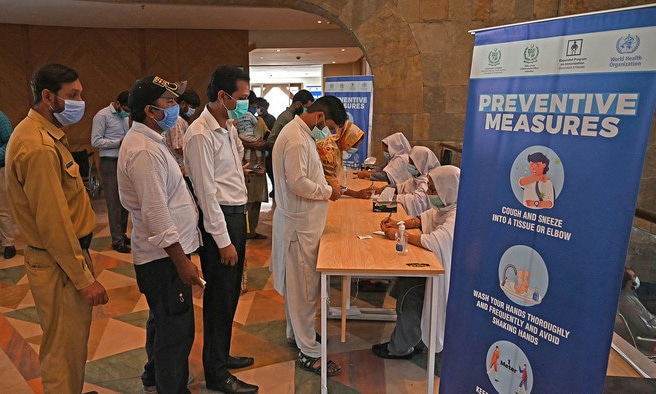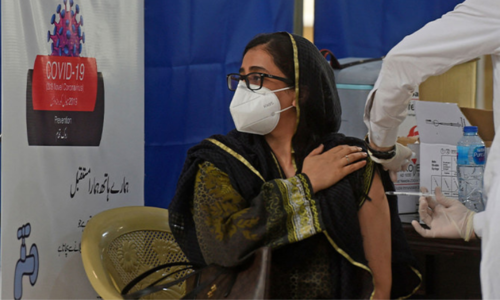• Job interviews, elective surgeries linked to inoculation certificates in Sindh
• Minister says fourth wave has started
• Sindh PMA opposes restrictions
• NCOC reports 25 deaths, over 1,737 cases
ISLAMABAD/KARACHI: The National Command and Operation Centre (NCOC) and Sindh government on Friday imposed further curbs on unvaccinated people to prevent the spread of Covid-19, prohibiting air travel from Aug 1 onwards and banning several facilities for them.
The latest measures come after an increase in coronavirus cases was witnessed throughout the country as well as the impending threat of an outbreak of the Delta variant.
On the other hand, the Pakistan Medical Association-Sindh (PMA) termed the restrictions imposed by the provincial government “harsh”, saying it would encourage business of fake Covid-19 vaccination cards.
In a meeting on Friday, the NCOC announced that people who had not been inoculated would not be allowed to travel by air from Aug 1. It also made it mandatory for all adult students to get themselves vaccinated by Aug 31.
A day after Prime Minister Imran Khan warned about the spread of the Delta variant, Asad Umar, who also heads the NCOC, admitted that the fourth wave had set in and issued new guidelines to check its spread.
In a tweet, he said: “2 weeks back I had tweeted that our artificial intelligence models are showing possible emergence of 4th wave. Now there are clear early signs of 4th wave starting. Poor sop compliance, coupled with spread of variants of concern, Indian variant in particular, are the main cause.”
In another tweet, he warned that action would be taken against those who did not comply with the standard operating procedures (SOPs).
“Field reports are showing complete disregard of the condition of vaccination for those attending indoor weddings and going to indoor restaurants & gyms. If the owners of these facilities do not show responsibility & ensure compliance, there will be no choice but to shut them down,” he said.
According to the forum’s statement, the Delta strain — also known as the Indian virus — is considered extremely dangerous.
It said the strain had not only caused deaths on a largescale in India but also added to the suffering of the patients due to lack of oxygen in hospitals.
The NCOC said there was a dire need to implement SOPs and expedite vaccination to avoid a situation similar to what India faced in the last few months.
Various proposals are under consideration to limit unnecessary movement during Eidul Azha, which will be decided in the next few days, including a restriction on tourism.
The forum said directives had once again been issued to ensure that employees in the private sector, small, medium and large industries, agriculture, media, lawyers as well as factory and market workers should be vaccinated.
It said people employed in the transport sector, hotels, gymnasiums, wedding halls, workshops and mosques should be inoculated by July 31 and students over 18 years by August 3.
People aged 30 years and above intending to travel to tourist destinations would not be able to make travel and hotel bookings without vaccination certificates. From August 1, this ban will also apply to people between the ages of 18 and 30 years.
Meanwhile, Pakistan reported 1,737 new Covid-19 cases in the past 24 hours, taking the country’s virus tally to 969,476.
As many as 25 Covid-19 patients died in a single day, 24 of whom were under treatment in hospitals.
According to the latest NCOC updates, 47,528 tests were performed during the last 24 hours out of which results of 1,737 patients came back positive. The positivity rate slightly increased compared to the previous days and was recorded at 3.6 per cent. Total number of active Covid-19 cases stood at 35,573 out of which 1,971 were in critical condition.
Maximum ventilators were in use in four major cities – Lahore, 18pc; Islamabad and Multan, 14pc; and Bahawalpur, 12pc.
Most oxygenated beds were in use in Skardu, which had an occupancy rate of 67pc, followed by Gilgit, 36pc; Rawalpindi, 20pc and Multan, 17pc.
Around 210 coronavirus patients were on vent elsewhere in the country.
Further curbs in Sindh
Just a month after the Sindh government decided to stop salaries of its employees who refused to get themselves inoculated, the provincial authorities on Friday banned several facilities to unvaccinated people, including treatment or major surgeries at hospitals as well as job interviews.
In an official announcement, the Sindh health department said people would not be allowed to visit even outdoor patients department (OPD) of hospitals without a vaccination certificate.
“Those who are vaccinated would be allowed to avail facility of elective surgeries,” said Sindh Director General Health Dr Irshad Memon.
“For medical services at both public and private hospitals, Covid-19 vaccination certificate is mandatory. For test and interviews for jobs, candidates should show their Covid-19 vaccination certificates. All public and private institutions would be responsible to check Covid-19 vaccination certificates,” the announcement said.
Sindh Chief Minister Murad Ali Shah had directed the finance ministry to stop the salaries from July of government employees who refused vaccination against the novel coronavirus.
Presiding over a meeting of the provincial task force on Covid-19 in the first week of June, which was attended by provincial ministers, chief secretary, law enforcers and medical experts, the chief minister had said: “Government employees who do not get themselves vaccinated will have their salaries stopped from July.”
He instructed the chief secretary to give the month of June for government employees to get inoculated and also declared Covid-19 vaccinations mandatory.
“We have to secure our citizens by taking some drastic measures,” he said.
The Sindh government in the latest announcement also banned entry of unvaccinated people into marriage halls, restaurants and eateries.
Replying to Dawn’s queries, health department spokesperson Atif Vighio explained that the restrictions would be effective forthwith.
“The deputy commissioners have the powers to issue on-the-spot orders under which they have already started the inspection process and taking action against shops and restaurants violating directives on the Covid-19 certificate. The officials can warn, fine and seal an outlet on violation,” Mr Vighio said.
Asked whether these restrictions reflect provincial government’s frustration over the fact that majority of the people in the province were still reluctant to get vaccinated, the spokesperson said curbs would help encourage the general public understand the need to get inoculated, while admitting that the Covid-19 vaccination rates in Khyber Pakhtunkhwa and Punjab were better.
“I think people are still not serious about Covid-19 and lack the understanding to get vaccinated on an urgent basis since infection rates have gone down,” he added.
According to health department officials, four million have so far been vaccinated against Covid-19 in the province since February.
About Covid-19 vaccination exemption on medical grounds, he said there were no guidelines by the NCOC on this matter.
“If a person is too old with health complications, it’s likely that he would be spending most of his time at home and, hence, wouldn’t pose a threat to others,” Mr Vighio said.
On the other hand, Sindh Transport Minister Owais Shah on Friday said only vaccinated people would be allowed to travel by public transport in the province.
In a statement, he said vaccination certificates of travellers would be checked to make sure they have gotten themselves vaccinated against Covid-19.
The minister also asked the transporters to follow the NCOC guidelines and issue travel tickets only to those who showed their vaccination certificates.
The minister warned that strict action would be taken against those who did not follow the instructions, adding that all regional transport secretaries and relevant departments had been directed to monitor the implementation of the order during Eid.
PMA reaction
The Pakistan Medical Association-Sindh (PMA) termed the restrictions “harsh” and warned the provincial government that this forced vaccination might encourage business of fake Covid-19 vaccination cards.
“Banning non-vaccinated patients from availing OPD service is not acceptable. People will feel harassed and might try wrong ways to get the vaccination certificate,” said PMA-Sindh President Dr Mirza Ali Azhar.
The government, he said, should make people understand the need to get vaccinated.
“It must make it palatable and the first step towards it is to tell them in a convincing manner that the vaccines pose no harm. The media can play a very positive role in this regard by presenting programmes on this subject as well as family physicians that are deeply trusted by their patients,” Dr Azhar said.
So far, Dr Azhar pointed out, the provincial government had vaccinated only 8pc of the Sindh’s total population.
“We need to get 80pc of the population vaccinated only then we can have herd immunity. And, this can be achieved by positively encouraging people and not by forced vaccination that includes the threat to stop salaries of non-vaccinated workers,” the PMA representative said.
Published in Dawn, July 10th, 2021














































